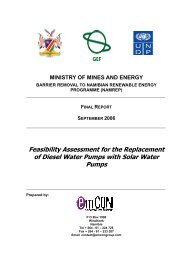STRATEGIC ACTION PLAN - Ministry of Mines and Energy
STRATEGIC ACTION PLAN - Ministry of Mines and Energy
STRATEGIC ACTION PLAN - Ministry of Mines and Energy
Create successful ePaper yourself
Turn your PDF publications into a flip-book with our unique Google optimized e-Paper software.
NNAA MMRREEPP<br />
––<br />
SSTTRRAATTEEGGI IICC AACCTTI IIOONN PPLLAANN FFOORR TTHHEE IIMMPPLLEEMMEENNTTAATTI<br />
I<br />
IIOONN OOFF RREENNEEWWAABBLLEE EENNEERRGGYY<br />
PPOOLLI IICCI IIEESS AASS OOUUTTLLI IINNEEDD IINN I TTHHEE WWHHI IITTEE PPAAPPEERR OONN EENNEERRGGYY PPOOLLI IICCYY<br />
Where do Renewable <strong>Energy</strong> <strong>and</strong> <strong>Energy</strong> Efficiency st<strong>and</strong> though? Has<br />
progress in this sector been as significant <strong>and</strong> groundbreaking for the Southern<br />
Africa Region?<br />
Frankly speaking, the answer is No.<br />
If one looks at this sector on a Regional basis, South Africa now appears to be<br />
the leader in Renewable <strong>Energy</strong> <strong>and</strong> <strong>Energy</strong> Efficiency. Since 1998, South Africa<br />
has not only promulgated its own <strong>Energy</strong> Policy, but also in 2003 a White Paper<br />
specifically on Renewable <strong>Energy</strong>. Furthermore, South Africa has embarked on<br />
several important renewable energy initiatives including, biodiesel production,<br />
large-scale wind turbines, <strong>of</strong>f-grid electricity production using woodgas, <strong>and</strong> the<br />
establishment <strong>of</strong> a Directorate <strong>of</strong> Renewable <strong>Energy</strong> within the Department <strong>of</strong><br />
Minerals <strong>and</strong> <strong>Energy</strong>.<br />
I believe Namibia has not been able to maintain its visionary edge in Renewable<br />
<strong>Energy</strong> <strong>and</strong> <strong>Energy</strong> Efficiency due to the following reasons:<br />
♦ There continues to be a wide-spread lack <strong>of</strong> underst<strong>and</strong>ing <strong>and</strong><br />
acknowledgement amongst energy stakeholders regarding the important<br />
opportunities that renewable energy can <strong>of</strong>fer to Namibia – particularly with<br />
respect to the increased energy <strong>and</strong> economic security that would result by<br />
creating a more diversified energy supply sector that is less prone to<br />
Regional <strong>and</strong> international problems <strong>of</strong> limited resources, politics <strong>and</strong><br />
currency fluctuations.<br />
♦ There has been a lack <strong>of</strong> honest reflection by energy stakeholders regarding<br />
the limitations <strong>of</strong> renewable energy – in particular the financial barriers <strong>and</strong><br />
the high degree <strong>of</strong> consumer awareness that renewable energy technologies<br />
require.<br />
♦ There has been a sense <strong>of</strong> complacency in Namibia regarding sustainable<br />
energy planning, since we came to accept as normal <strong>and</strong> everlasting the<br />
exceptionally inexpensive electricity supply rates from South Africa.<br />
♦ There has been too little coordination within the renewable energy sector <strong>and</strong><br />
too much experimentation with consumers. This especially applies to rural<br />
consumers, which <strong>of</strong>ten had to bear the brunt when technological<br />
experiments failed. Namibia’s solar energy fee-for-service approach is one<br />
example.<br />
But times are changing. There is an unprecedented level <strong>of</strong> awareness about<br />
energy in Namibia. This awareness is enhanced each time the petrol <strong>and</strong> diesel<br />
prices need to be increased, <strong>and</strong> when consumers are notified <strong>of</strong> possible<br />
electricity interruptions in the very near future.<br />
66




